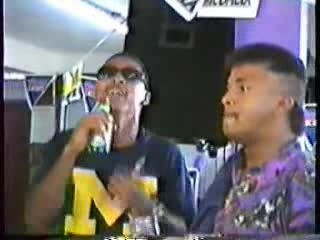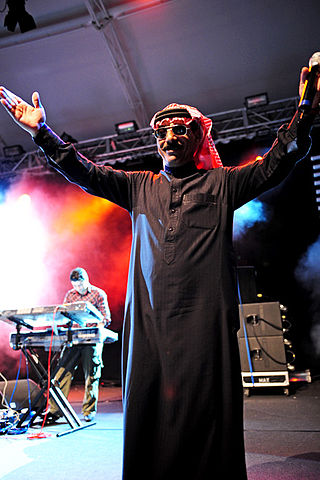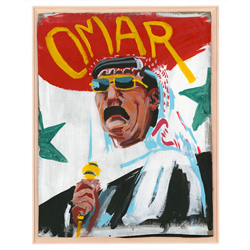Related Research Articles
Electronica is both a broad group of electronic-based music styles intended for listening rather than strictly for dancing and a music scene that came to prominence in the early 1990s in the United Kingdom. In the United States, the term is mostly used to refer to electronic music generally.

The United States' multi-ethnic population is reflected through a diverse array of styles of music. It is a mixture of music influenced by the music of Europe, Indigenous peoples, West Africa, Latin America, Middle East, North Africa, amongst many other places. The country's most internationally renowned genres are traditional pop, jazz, blues, country, bluegrass, rock, rock and roll, R&B, pop, hip-hop/rap, soul, funk, religious, disco, house, techno, ragtime, doo-wop, folk, americana, boogaloo, tejano, surf, and salsa, amongst many others. American music is heard around the world. Since the beginning of the 20th century, some forms of American popular music have gained a near global audience.
Digital hardcore is a fusion genre that combines hardcore punk with electronic dance music genres such as breakbeat, techno, and drum and bass while also drawing on heavy metal and noise music. It typically features fast tempos and aggressive sound samples. The style was pioneered by Alec Empire of the German band Atari Teenage Riot during the early 1990s, and often has sociological or leftist lyrical themes.
Chilean music refers to all kinds of music developed in Chile, or by Chileans in other countries, from the arrival of the Spanish conquistadors to the modern day. It also includes the native pre-Columbian music from what is today Chilean territory.

Reggaeton is a modern style of popular and electronic music that originated in Panama during the late 1980s, and which rose to prominence in the late 1990s and early 2000s through a plethora of Puerto Rican musicians. It has evolved from dancehall, with elements of hip hop, Latin American, and Caribbean music. Vocals include toasting/rapping and singing, typically in Spanish.

The traditional music of Jordan has a long history. Rural zajal songs, with improvised poetry played with a mijwiz, tablah, arghul, oud, rabab, and reed pipe ensemble accompanying is popular. The transition of old cultural music into hit pop songs known worldwide. Recently, Jordan has seen the rise of prominent DJs and pop stars.
Senegalese hip hop is a form of hip hop that originated in Senegal in the early 1980s. When hip hop first hit the scene in Africa, it went from merely being a fad, to a more social and political movement. Amongst the most influential leaders of this movement were artists from the country of Senegal. With the modernization of the country, and the rise in media, the youth of Senegal were able to embrace a new form of expression.

Kuduro is a type of music and dance from Angola. It is characterized as uptempo, energetic, and danceable. Kuduro was developed in Luanda, Angola, in the late 1980s. Producers sampled traditional carnival music like soca and zouk béton from the Caribbean to Angola, house and techno playing from Europe.
Arabic hip-hop is a segment of hip hop music performed in the Arabic-speaking world. Due to variety of dialects and local genres which exist in the localities, Arabic hip-hop music may appear very diverse depending on the country of the song. Like most artists of the genre, the hip-hop artists from the Arabic-speaking world are highly influenced by American hip-hop.
Psychedelic music is a wide range of popular music styles and genres influenced by 1960s psychedelia, a subculture of people who used psychedelic drugs such as DMT, LSD, mescaline, and psilocybin mushrooms, to experience synesthesia and altered states of consciousness. Psychedelic music may also aim to enhance the experience of using these drugs and has been found to have a significant influence on psychedelic therapy.
Arabic pop music or Arab pop music is a subgenre of pop music and Arabic music.

Omar Almasikh, better known by his stage name Omar Souleyman, is a Syrian singer. He began his career in 1994 singing at weddings and has since released numerous records and performed all over the world. He produces a modernized version of the traditional dabke.
Alternative dance is a musical genre that mixes alternative rock with electronic dance music. Although largely confined to the British Isles, it has gained American and worldwide exposure through acts such as New Order in the 1980s and the Prodigy and in the 1990s.
Tribal guarachero, also known as trival, is a music genre that fuses electronic dance music with cumbia or certain rhythms from regional Mexican music genres.
Gqom, gqom tech, sgubhu, 3-step or G.Q.O.M) is an African electronic dance music genre and subgenre of house music, that emerged in the early 2010s from Durban, South Africa, pioneered and innovated by music producers Naked Boyz, Rudeboyz, Sbucardo, Griffit Vigo, Nasty Boyz, DJ Lag, Menzi Shabane, Distruction Boyz and Citizen Boy.

Shamstep is a Levantine genre of electronic dance music that combines the traditional forms of Dabke music with electronic instruments. 'Sham' is the Arabic name for the region of Greater Syria, Syria-Palestine or the Levant. The term 'Shamstep' was coined by the Jordanian-Palestinian band 47Soul to describe their music.

Muthoni Drummer Queen or Muthoni Ndonga is a Kenyan rapper, drummer and cultural entrepreneur. Her music genres include hip-hop, reggae/dancehall and soul/blues. She produces alternative electro-hip-hop music and founded the festivals Africa Nouveau and Blankets & Wine in East Africa.
Underground music in Iraq refers to the alternative and often subversive music scene that has grown and evolved in Iraq since the early 2000s. Despite numerous societal and governmental challenges, this robust underground scene has been a platform for a generation of Iraqi musicians to express their artistic vision and often controversial ideas. The music genres within the Iraqi underground scene are diverse, ranging from punk rock to hip hop to electronic music and beyond.

Wenu Wenu is the debut studio album by Syrian singer Omar Souleyman, released on 21 October 2013 on the American independent record label Ribbon Music. Although at the time of the album's release he already had a 20-year career and an extensive catalog of self-published live recordings, it is technically his first studio offering. Souleyman specializes in the dabke genre, which is typical at Levantine wedding parties, and his unique take on the genre—known for its electronic, minimalist sound—began to catch the attention of Western avant-garde and club music audiences after being included in bootleg compilations on the Sublime Frequencies label beginning in 2006. Following this, the singer started touring internationally, and his studio debut was preceded by collaborations with established Western acts such as Björk, Caribou and Damon Albarn.

Shkoon is a German–Syrian band based in Hamburg, Germany. The band was formed in 2015 when Ameen Khayer and Thorben Diekmann met during a spontaneous jam session in their flat. Their music is a message for cultural diversity that mixes old traditional music elements of the Arab community, such as Syrian folklore with modern electronic beats. Shkoon released their debut album Rima in 2019, followed by their live album Firaq in 2022, and their latest studio album Masrahiya in 2023.
References
- ↑ "Syrian Metal in the Civil War | norient.com". norient.com. Retrieved 2023-06-29.
- 1 2 "Arab Underground Music: Politics, Revolution, and Social Change". Raseef22. 2016-12-08. Retrieved 2023-06-29.
- ↑ "Syrian bands rock Beirut's alternative music scene". Middle East Eye. 2015. Retrieved 2023-06-29.
- ↑ "Underground House Syria: Sowing the Seeds of Dance Music Amidst the Ravages of War". www.scenenoise.com. Retrieved 2023-06-29.
- ↑ Makki, Danny (2022-06-03). "Syria's underground dance music scene is a welcome distraction in tough times". The National. Retrieved 2023-06-29.
- ↑ D'Ignoti, Stefania. "The Aleppo electronic artists using music to heal in Gaziantep". www.aljazeera.com. Retrieved 2023-06-29.
- ↑ "OMAR SOULEYMAN – Love him or hate him". Andy Morgan Writes. Archived from the original on 2014-07-14. Retrieved 2014-08-02.
- ↑ Tahiat Mahboob (June 20, 2017). "Refugees of Rap to Country for Syria: 6 musical acts without borders". cbcmusic.ca. Retrieved January 16, 2019.